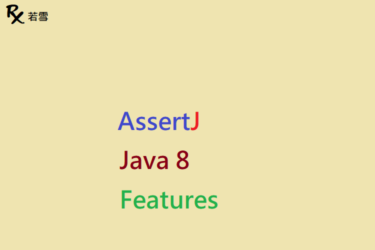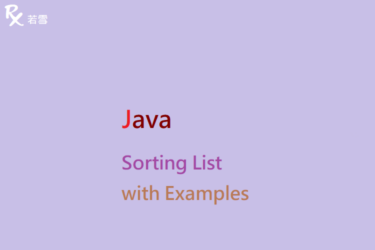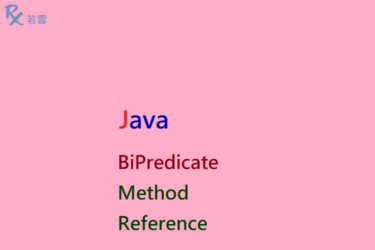Table of Contents
ToggleJava BiPredicate Interface
常用於集合或 Stream 中的過濾條件,也可當作其他方法的傳入參數或是引用其他方法為實例, BiPredicate Interface 介紹 Collection 中的 removeIf 、 partitioningBy 與 Stream 中的 filter 、 allMatch 等方法,了解 BiPredicate 的不同操作和方法,本篇增加了範例,並透過單元測試來驗證產出結果。
@FunctionalInterface
public interface BiPredicate<T> {
boolean test(T t, U u);
}
檔案目錄
./
+- src
+- test
| +- org
| +- ruoxue
| +- java_147
| +- functional
| +- bipredicate
| +- BiPredicateInterfaceTest.java 單元測試
BiPredicate Interface Java 提供 Collection 中的 removeIf 、 partitioningBy 與 Stream 中的 filter 、 allMatch 等方法操作 BiPredicate Interface 。
Food
BiPredicate Interface Java 建立 Food 類別,覆寫 equals 、 hashCode ,定義屬性和方法,用來建立一個物件。
@NoArgsConstructor
@Getter
@Setter
@Builder
public static class Food {
private String name;
private double quantity;
private int type;
public Food(String name, double quantity, int type) {
this.name = name;
this.quantity = quantity;
this.type = type;
}
public String toString() {
ToStringBuilder builder = new ToStringBuilder(this, ToStringStyle.JSON_STYLE);
builder.appendSuper(super.toString());
builder.append("name", name);
builder.append("quantity", quantity);
builder.append("type", type);
return builder.toString();
}
public boolean equals(Object object) {
if (!(object instanceof Food)) {
return false;
}
if (this == object) {
return true;
}
Food other = (Food) object;
return new EqualsBuilder().append(getName(), other.getName()).isEquals();
}
public int hashCode() {
return new HashCodeBuilder().append(getName()).toHashCode();
}
}Collection_removeIf
BiPredicate Interface Java 建立 BiPredicate , List 增加三個元素,移除符合條件的元素。
@Test
public void Collection_removeIf() {
int expectedSize = 1;
List<String> list = new ArrayList<>(Arrays.asList("Bacon", "Ham", "Pork"));
BiPredicate<String, Integer> lengthGreaterThan = (s, i) -> s.length() > i;
list.removeIf(e -> lengthGreaterThan.test(e, 3));
System.out.println(list);
assertEquals(expectedSize, list.size());
List<Food> foodList = new ArrayList<>(
Arrays.asList(new Food("Bacon", 1, 1), new Food("Ham", 2, 1), new Food("Pork", 3, 1)));
BiPredicate<Food, String> startsWith = (o, s) -> o.name.startsWith(s);
BiPredicate<Food, String> contains = (o, s) -> o.name.contains(s);
foodList.removeIf(e -> startsWith.and(contains).test(e, "B"));
System.out.println(foodList);
assertEquals(2, foodList.size());
}[Ham]
[{"name":"Ham","quantity":2.0,"type":1}, {"name":"Pork","quantity":3.0,"type":1}]
Collectors_partitioningBy
BiPredicate Interface Java 建立 BiPredicate , List 增加三個元素,分區符合條件的元素。
@Test
public void Collectors_partitioningBy() {
int expectedSize = 2;
List<String> list = Arrays.asList("Bacon", "Ham", "Pork");
BiPredicate<String, Integer> lengthGreaterThan = (s, i) -> s.length() > i;
Map<Boolean, List<String>> map = list.stream()
.collect(Collectors.partitioningBy(e -> lengthGreaterThan.test(e, 3)));
System.out.println(map);
assertEquals(expectedSize, map.size());
List<Food> foodList = Arrays.asList(new Food("Bacon", 1, 1), new Food("Ham", 2, 1), new Food("Pork", 3, 1));
BiPredicate<Food, String> startsWith = (o, s) -> o.name.startsWith(s);
BiPredicate<Food, String> contains = (o, s) -> o.name.contains(s);
Map<Boolean, List<Food>> foodMap = foodList.stream()
.collect(Collectors.partitioningBy(e -> startsWith.and(contains).test(e, "B")));
System.out.println(foodMap);
assertEquals(expectedSize, foodMap.size());
}{false=[Ham], true=[Bacon, Pork]}
{false=[{"name":"Ham","quantity":2.0,"type":1}, {"name":"Pork","quantity":3.0,"type":1}], true=[{"name":"Bacon","quantity":1.0,"type":1}]}
Stream_filter
BiPredicate Interface in Java 建立 BiPredicate , List 增加三個元素,過濾符合條件的元素。
@Test
public void Stream_filter() {
int expectedSize = 2;
List<String> list = Arrays.asList("Bacon", "Ham", "Pork");
BiPredicate<String, Integer> lengthGreaterThan = (s, i) -> s.length() > i;
list = list.stream().filter(e -> lengthGreaterThan.test(e, 3)).collect(Collectors.toList());
System.out.println(list);
assertEquals(expectedSize, list.size());
List<Food> foodList = Arrays.asList(new Food("Bacon", 1, 1), new Food("Ham", 2, 1), new Food("Pork", 3, 1));
BiPredicate<Food, String> startsWith = (o, s) -> o.name.startsWith(s);
BiPredicate<Food, String> contains = (o, s) -> o.name.contains(s);
foodList = foodList.stream().filter(e -> startsWith.and(contains).test(e, "B")).collect(Collectors.toList());
System.out.println(foodList);
assertEquals(1, foodList.size());
}[Bacon, Pork]
[{"name":"Bacon","quantity":1.0,"type":1}]
Stream_allMatch
BiPredicate Interface in Java 建立 BiPredicate , List 增加三個元素,過濾符合條件的元素。
@Test
public void Stream_allMatch() {
List<String> list = Arrays.asList("Bacon", "Ham", "Pork");
BiPredicate<String, Integer> lengthGreaterThan = (s, i) -> s.length() > i;
boolean result = list.stream().allMatch(e -> lengthGreaterThan.test(e, 2));
System.out.println(result);
assertTrue(result);
List<Food> foodList = Arrays.asList(new Food("Bacon", 1, 1), new Food("Ham", 2, 1), new Food("Pork", 3, 1));
BiPredicate<Food, String> startsWith = (o, s) -> o.name.startsWith(s);
BiPredicate<Food, String> contains = (o, s) -> o.name.contains(s);
result = foodList.stream().allMatch(e -> startsWith.and(contains).test(e, "B"));
System.out.println(result);
assertFalse(result);
}true
falseBiPredicateInterfaceTest.java
BiPredicate Interface in Java 新增單元測試,驗證 Java BiPredicate Interface Example 是否符合預期。
package org.ruoxue.java_147.functional.bipredicate;
import static org.junit.Assert.*;
import java.util.ArrayList;
import java.util.Arrays;
import java.util.List;
import java.util.Map;
import java.util.function.BiPredicate;
import java.util.stream.Collectors;
import org.apache.commons.lang3.builder.EqualsBuilder;
import org.apache.commons.lang3.builder.HashCodeBuilder;
import org.apache.commons.lang3.builder.ToStringBuilder;
import org.apache.commons.lang3.builder.ToStringStyle;
import org.junit.Test;
import lombok.Builder;
import lombok.Getter;
import lombok.NoArgsConstructor;
import lombok.Setter;
public class BiPredicateInterfaceTest {
@NoArgsConstructor
@Getter
@Setter
@Builder
public static class Food {
private String name;
private double quantity;
private int type;
public Food(String name, double quantity, int type) {
this.name = name;
this.quantity = quantity;
this.type = type;
}
public String toString() {
ToStringBuilder builder = new ToStringBuilder(this, ToStringStyle.JSON_STYLE);
builder.appendSuper(super.toString());
builder.append("name", name);
builder.append("quantity", quantity);
builder.append("type", type);
return builder.toString();
}
public boolean equals(Object object) {
if (!(object instanceof Food)) {
return false;
}
if (this == object) {
return true;
}
Food other = (Food) object;
return new EqualsBuilder().append(getName(), other.getName()).isEquals();
}
public int hashCode() {
return new HashCodeBuilder().append(getName()).toHashCode();
}
}
@Test
public void Collection_removeIf() {
int expectedSize = 1;
List<String> list = new ArrayList<>(Arrays.asList("Bacon", "Ham", "Pork"));
BiPredicate<String, Integer> lengthGreaterThan = (s, i) -> s.length() > i;
list.removeIf(e -> lengthGreaterThan.test(e, 3));
System.out.println(list);
assertEquals(expectedSize, list.size());
List<Food> foodList = new ArrayList<>(
Arrays.asList(new Food("Bacon", 1, 1), new Food("Ham", 2, 1), new Food("Pork", 3, 1)));
BiPredicate<Food, String> startsWith = (o, s) -> o.name.startsWith(s);
BiPredicate<Food, String> contains = (o, s) -> o.name.contains(s);
foodList.removeIf(e -> startsWith.and(contains).test(e, "B"));
System.out.println(foodList);
assertEquals(2, foodList.size());
}
@Test
public void Collectors_partitioningBy() {
int expectedSize = 2;
List<String> list = Arrays.asList("Bacon", "Ham", "Pork");
BiPredicate<String, Integer> lengthGreaterThan = (s, i) -> s.length() > i;
Map<Boolean, List<String>> map = list.stream()
.collect(Collectors.partitioningBy(e -> lengthGreaterThan.test(e, 3)));
System.out.println(map);
assertEquals(expectedSize, map.size());
List<Food> foodList = Arrays.asList(new Food("Bacon", 1, 1), new Food("Ham", 2, 1), new Food("Pork", 3, 1));
BiPredicate<Food, String> startsWith = (o, s) -> o.name.startsWith(s);
BiPredicate<Food, String> contains = (o, s) -> o.name.contains(s);
Map<Boolean, List<Food>> foodMap = foodList.stream()
.collect(Collectors.partitioningBy(e -> startsWith.and(contains).test(e, "B")));
System.out.println(foodMap);
assertEquals(expectedSize, foodMap.size());
}
@Test
public void Stream_filter() {
int expectedSize = 2;
List<String> list = Arrays.asList("Bacon", "Ham", "Pork");
BiPredicate<String, Integer> lengthGreaterThan = (s, i) -> s.length() > i;
list = list.stream().filter(e -> lengthGreaterThan.test(e, 3)).collect(Collectors.toList());
System.out.println(list);
assertEquals(expectedSize, list.size());
List<Food> foodList = Arrays.asList(new Food("Bacon", 1, 1), new Food("Ham", 2, 1), new Food("Pork", 3, 1));
BiPredicate<Food, String> startsWith = (o, s) -> o.name.startsWith(s);
BiPredicate<Food, String> contains = (o, s) -> o.name.contains(s);
foodList = foodList.stream().filter(e -> startsWith.and(contains).test(e, "B")).collect(Collectors.toList());
System.out.println(foodList);
assertEquals(1, foodList.size());
}
@Test
public void Stream_allMatch() {
List<String> list = Arrays.asList("Bacon", "Ham", "Pork");
BiPredicate<String, Integer> lengthGreaterThan = (s, i) -> s.length() > i;
boolean result = list.stream().allMatch(e -> lengthGreaterThan.test(e, 2));
System.out.println(result);
assertTrue(result);
List<Food> foodList = Arrays.asList(new Food("Bacon", 1, 1), new Food("Ham", 2, 1), new Food("Pork", 3, 1));
BiPredicate<Food, String> startsWith = (o, s) -> o.name.startsWith(s);
BiPredicate<Food, String> contains = (o, s) -> o.name.contains(s);
result = foodList.stream().allMatch(e -> startsWith.and(contains).test(e, "B"));
System.out.println(result);
assertFalse(result);
}
}心得分享
Java BiPredicate Interface Example 使用 Lambda 表達式能讓程式碼更加簡潔與直接,取代傳統實作接口的方法,減少了很多程式碼,大幅提高可讀性, BiPredicate Interface in Java 提供了幾種 BiPredicate 常見方法的操作範例,熟悉這些方法的操作,能夠提高開發效率,節省維護上的成本。




